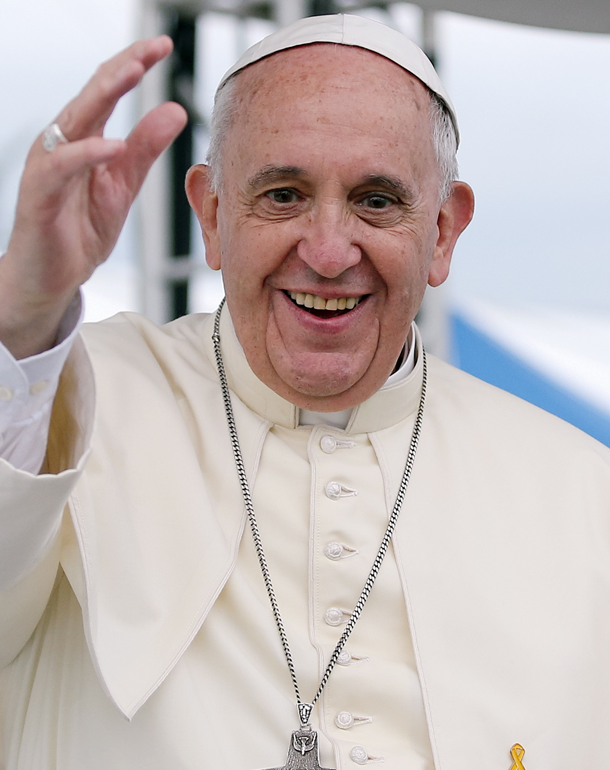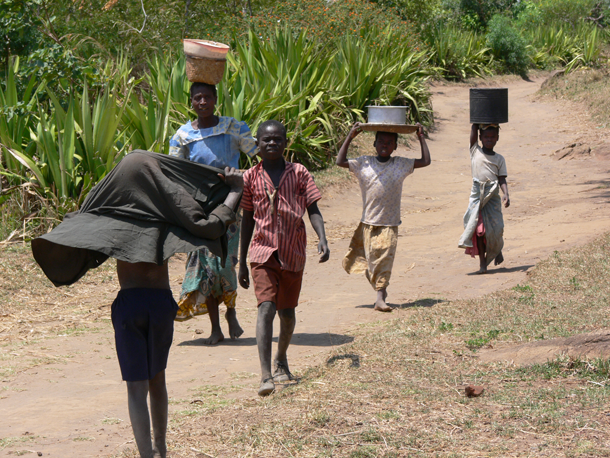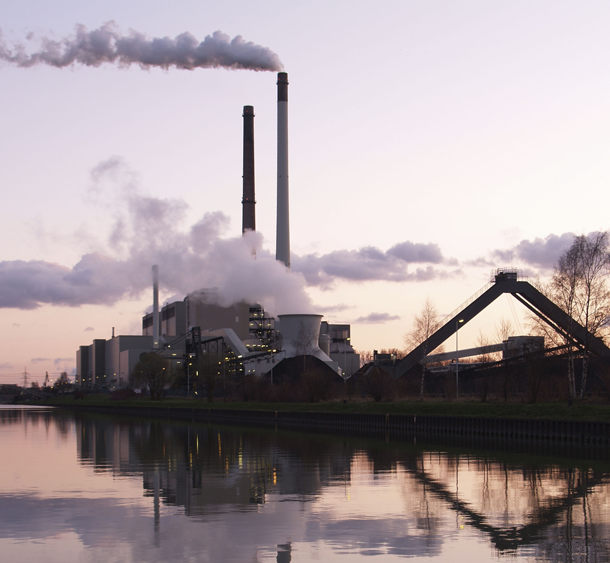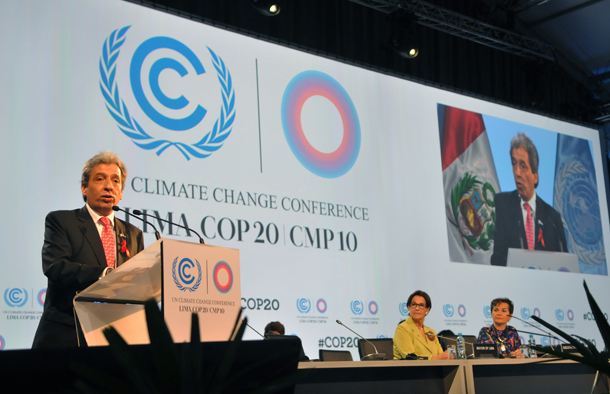Pope Francis and the Climate: Laudato Si'
Air Date: Week of April 25, 2025

Pope Francis was a chemical technician in Argentina before joining the seminary. (Photo: Korean Culture and Information Service, CC BY-SA 2.0)
As the world remembers the legacy of Pope Francis we return to his groundbreaking 2015 encyclical, “Laudato Si’: On Care for Our Common Home.” It's a poetic, emotional call for a fundamental shift in our economic system, and a rethinking of our relationship with God's creation: the natural world. Assistant Professor of Theology, Science and Ethics at Fordham University, Christiana Zenner, discussed with Host Steve Curwood the Pope's powerful message.
Transcript
CURWOOD: From PRX and the Jennifer and Ted Stanley Studios at the University of Massachusetts Boston, this is Living on Earth. I’m Steve Curwood.
BELTRAN: And I’m Paloma Beltran.
On Easter Monday and the eve of Earth Day the world lost a champion of the environment and social justice. Pope Francis had chosen his name to pay homage to St. Francis of Assisi, the patron saint of animals and the environment. This first Jesuit Pope led the Catholic Church during more than a decade of worsening environmental disruption.
CURWOOD: Pope Francis recognized the climate crisis as a spiritual crisis and called upon all of humanity to address it. In September of 2015 he visited Washington, D.C. and gave a speech at the White House alongside President Obama.
POPE FRANCIS: Climate change is a problem which can no longer be left to a future generation. When it comes to the care of our “common home”, we are living at a critical moment of history. We still have time to make the changes needed to bring about “a sustainable and integral development, for we know that things can change.”
CURWOOD: During those remarks Pope Francis drew on his landmark encyclical Laudato Si’: On Care for our Common Home, published in May 2015. Around that time Fordham University professor of theology, science and ethics, Christiana Zenner joined us to explain the document and its importance, and here’s our conversation.
ZENNER: An encyclical is an authoritative teaching document issued by a pope that addresses issues of faith and morality, generally having to do with issues that are coming up in contemporary life. To the question of how important encyclicals are, they're really, really important. They're among the most authoritative teachings that the Catholic church has. And they're meant to be guidelines: sets of moral guidelines, frameworks, paradigms, reference documents to guide Catholics and Bishops and people of goodwill in thinking about matters of common concern.
CURWOOD: The headlines on this encyclical have focused on the warming climate and the Pope's call for the phaseout of fossil fuels, but before we get to some specifics, let's talk about the Pope's overall approach here. This encyclical opens by calling for a new and universal solidarity among humans. What's he talking about?
ZENNER: Right. That's a vast idea that sounds like it might have something to do with the climate, and it does. But you're absolutely right that it's not just a climate encyclical. This is, as I see it, a real salvo from the Pope to all of humanity asking for universal solidarity on issues of common concern and especially on the question of the Earth, — or, in theological language, creation. He leads with the fact that the planet is falling into a state of disrepair, people are deeply mired in poverty, and this represents a failure of human responsibility. So his invitation is to a renewed, transformative form of responsibility and global solidarity with one another, involving care for the Earth as our common home. So that’s part of why the document is subtitled, "On the care of our common home."

Children hauling water in Malawi. Pope Francis points to global inaccessibility and inequity of environmental resources as a problem, and the burden of this consumption issue often falls on those least responsible for it. (Lars Plougmann, CC BY-SA 2.0)
CURWOOD: Now, what kind of relationship is the Pope calling for humans to have with nature, what he calls creation?
ZENNER: Yeah, you know, this document is really fascinating because it draws on established Catholic social teaching on the environment, some ideas that really got going with Pope John Paul II and Pope Benedict XVI. But at the heart of this document is relationships. So I would say that far more than being a policy white paper or a political précis on how various international negotiations ought to proceed, it's a document on ethics, it's a document of moral vision. And it's calling for a kind of transformation in the way we regard our relationships: between humans and God, humans and each other, and humans and the planet. And the Pope's diagnosis is that there are real spiritual malaises, as well as structural impediments, to the right functioning of those relationships at present. The Pope says the church has interpreted humans as having dominion over the planet, and that dominion has too often been lived out as domination. Christians and Church history who have done this are wrong. We need to get back to a better and more accurate interpretation, and here's what that would look like.
CURWOOD: So, in this, he seems very concerned about environmental refugees. What do you think motivated that?
ZENNER: I think the Pope sees a lot of the dynamics of environmental degradation globally as driven by economic structures of profit, and a focus on economic development and growth that is not accountable to the limitations of what the planet can absorb. And it is not accountable to the burdens that are carried by people living in poverty. So, as a Pope who comes from South America, who spent time in slums, who has written extensively about the lives of the poor and problems of neocolonialism, and who has had critiques, frankly, of what he has called the deified market, making the market into something like an idol or God — he’s very concerned with the fact that people no longer have homes, literally and metaphorically. So environmental refugees, you know that's a huge problem for people displaced by, say, large dams or rapid desertification. But it's also a spiritual problem in, as he writes, "everyone needs a home and is entitled to a home."
CURWOOD: Let's talk about his economics. How radical is his vision? It sounds like he's calling for a revolution in this document.
ZENNER: You know, I think he is. I think he is calling for a revolution. Now it's never going to be a violent revolution, it's never going to be reducible to endorsing a particular form of political economy. But what he's saying is so much in line with what folks like Gus Speth and others thinking about the new economy have been talking about. And that is simply that there need to be moral limits on economic quote on quote progress. So he writes about how in an era where human creativity has issued forth in robust kinds of technological advances and the creation of amazing wealth. The fact of the matter is that inequalities persist. And he has a great quote in the document where he says that the environment is deteriorating, and we still have not solved the problem of poverty. And he goes on to explain how our moral capabilities and our powers of reflection and action have not caught up with the powers of our technology and our economic systems. And that is to the detriment of all of us, especially the planet and the poor.

A coal power plant in Germany. The Pope says that consumption of non-renewable resources is destroying our common home. (Photo: Arnold Paul, CC BY-SA 3.0)
CURWOOD: Now, specifically on the climate, he says, look, humans are responsible for most of what's going on, and in terms of the international negotiations, he calls for us to deal with them with “common and differentiated responsibilities.” What does he want? What's he talking about?
ZENNER: Well, the language of "common and differentiated responsibilities" is one that you see in diplomacy and in the history of negotiations over international climate treaties. So, I think that the Pope has a significant, powerful audience in mind for this encyclical. Yes, it's directed to everyone on the planet, but there are a lot of passages that are directed towards super developed nations, such as our own. And what he says here is that while there have been some successful international treaties in the past, there have also been some real failures — the Kyoto Protocol, for example, and even more recent climate negotiations. And he is extremely and really quite exquisitely clear that the burdens have been caused by certain industrial actors — we are central among them — and the responsibility for them must be taken on primarily by those countries which have benefited the most. So he uses the language here of an ecological and social debt that highly developed nations owe to less developed nations. And this is really powerful language. He even goes so far as to say, in terms of particular options, that he's unconvinced that carbon pricing or cap-and-trade would do anything more than simply be a bandage, that doesn't amount to the radical change that is required by the situation. And that's his phrase, the radical change that is necessary.
CURWOOD: Yeah, looking at that section where he has his strategy of buying and then selling carbon credits can lead to a new form of speculation, and it goes onto say it may simply become a ploy which permits maintaining the excessive consumption of some countries and sectors.
ZENNER: Exactly.

In chapter five of the encyclical, Pope Francis discusses the environment and our responsibility as an international community to it and each other. More and more, climate talks and negotiations like the 1992 Earth Summit and 2014’s COP20 set out to cooperate to reduce global pollution and fix social injustices but ultimately fall flat due to inaction and non-compliance. (Photo: Elekhh, Wikimedia CC BY-SA 2.0)
CURWOOD: Now, consumption is the problem from his perspective in this — not population — and he talks about, let me quote him here, “this paradigm over consumption that leads people to believe that they are free as long as they have the supposed freedom to consume.” What does he mean?
ZENNER: What the Pope is saying in this document is that the idea of human freedom as amounting to what we can buy, or what we can consume, that gives us momentary utility or pleasure — he thinks that is an impoverished form of freedom. He talks about the need for an authentic human freedom that means, for example, that all people have basically livable standards of life, including, he talks about in paragraph 30 — one of my particular interests — the right to clean water, and various other fundamental issues that undergird the right to a life with dignity. Obviously population politics, reproduction, and the Catholic Church — that’s a big topic, and the Pope doesn’t really get into the reproductive aspects, or sexual ethics or any of that. What he says — and frankly, I think he’s right, at least on this part — is that we can’t merely think about the environmental crisis as a problem of sheer numbers. That’s just flat footed. Yes, people impact the planet, so, logically, it would make sense that more people would impact the planet more. But he rightly points out that there are certain sectors of humanity, I’m among them, you’re among them, the listeners on this show are among them, who consume so much more than our fair share, that we really need to take a look at our own mentalities of consumption and the spiritual malaise that accompanies them. As a professor and as someone who has been very struck by the powerful analyses in this document, my hope is actually that people sit down with it and read it. Even if it’s bit by bit, or little by little, all 246 paragraphs — not with the idea that it needs to be analyzed and that it provides a specific road map of who to vote for; it doesn’t. But to read it as a document of contemplation, and to try to see with the eyes of poetry and beauty and ethics what the pope might be asking of us, and what various ways of living that out might be. Not everyone’s going to agree with everything in there, but the document really is an invitation and a set of principles for moral reflection.
CURWOOD: That’s Christiana Zenner of Fordham University. We spoke in 2015 when Pope Francis published his groundbreaking encyclical on the environment and climate, Laudato Si’: On Care for Our Common Home. We’ll be back after the break to talk about its even bolder sequel as we continue marking his legacy. Stay tuned to Living on Earth.
Links
Pope Francis’s “Laudato Si” Encyclical Letter
Statement by President Barack Obama on Pope Francis’s Encyclical
Christiana Zenner (Peppard's) chapter by chapter summary and analysis of the encyclical
“On Planet in Distress, a Papal Call to Action”
Living on Earth wants to hear from you!
Living on Earth
62 Calef Highway, Suite 212
Lee, NH 03861
Telephone: 617-287-4121
E-mail: comments@loe.org
Newsletter [Click here]
Donate to Living on Earth!
Living on Earth is an independent media program and relies entirely on contributions from listeners and institutions supporting public service. Please donate now to preserve an independent environmental voice.
NewsletterLiving on Earth offers a weekly delivery of the show's rundown to your mailbox. Sign up for our newsletter today!
 Sailors For The Sea: Be the change you want to sea.
Sailors For The Sea: Be the change you want to sea.
 The Grantham Foundation for the Protection of the Environment: Committed to protecting and improving the health of the global environment.
The Grantham Foundation for the Protection of the Environment: Committed to protecting and improving the health of the global environment.
 Contribute to Living on Earth and receive, as our gift to you, an archival print of one of Mark Seth Lender's extraordinary wildlife photographs. Follow the link to see Mark's current collection of photographs.
Contribute to Living on Earth and receive, as our gift to you, an archival print of one of Mark Seth Lender's extraordinary wildlife photographs. Follow the link to see Mark's current collection of photographs.
 Buy a signed copy of Mark Seth Lender's book Smeagull the Seagull & support Living on Earth
Buy a signed copy of Mark Seth Lender's book Smeagull the Seagull & support Living on Earth

